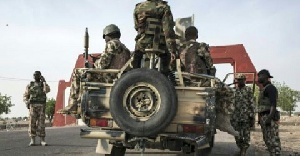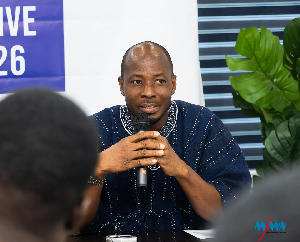STATEMENT
BY HON. SHERRY AYITTEY, MINISTER OF ENVIRONMENT, SCIENCE AND TECHNOLOGY, GHANA,
AT THE COP 17/CMP7 UNITED NATIONS CLIMATE CHANGE CONFERENCE, 28TH NOVEMBER-9TH
DECEMBER 2011, DURBAN, SOUTH AFRICA
Your Excellency Madam
Maite Nkoana-Mashabane, COP President and members of the Bureau,
Your Excellences
Heads of Delegations and Colleague Ministers,
Distinguished
representatives of States Parties, International Organizations, Civil Society
and Media,
Ladies and Gentlemen,
Let me commend the Government and people of South Africa for hosting
this very important Conference on the soil of Africa and for the excellent
facilities placed at our disposal since our arrival in this beautiful city of
Durban.
In line with our common African position my delegation wishes to
emphasize the importance of a fair, balanced and credible outcome in Durban.
We wish, therefore,
to associate ourselves with the positions of the African Group and the Group of
77 and China, as elaborated in the various interventions in this conference.
Ghana urges Parties to fulfill their pledges and commitments under the
Copenhagen and Cancun Agreements and provide clear and unambiguous commitments
on fast-start funding and of the climate Green fund.
Madam President, Ghana remains resolute in her call for a second
commitment period, under the Kyoto Protocol. Durban must be decisive in avoiding
a gap in the future of the Protocol and we sincerely hope that the Kyoto
Protocol would not be terminated on African soil.
Discussions at this conference should provide a global roadmap that
would define a second binding commitment period by Annex 1 state parties,
taking into consideration our common desire to save our planet based on the
principles of common but differentiated responsibilities, equity and the rule
of law.
Madam President, adaptation remains the most prioritized and essential
component of any Durban outcome.
We therefore call for the complete operationalization of the Cancun
Agreements, including capitalization of the Green Climate Fund and
identification of other long term financing sources, technology development and
transfer and capacity building. Ghana would also like to see the establishment
of the Adaptation Committee and clear guidelines on measurement, reporting and
verification of NAMAs and REDD+.
Additionally, Durban must deliver on Climate Smart Agriculture and the
mainstreaming of gender and climate change in national development plans.
In developing a policy for climate change, Ghana aimed at three broad
objectives of effective adaptation, a low carbon growth path and social
development. We seek to attain these objectives by refocusing on seven building
blocks of governance and coordination, capacity building, finance, research and
knowledge management, international cooperation, communication, monitoring and
evaluation.
We have developed a Gender strategy which is being piloted in the
northern part of our country where the women are the most vulnerable. Our
climate change adaptation strategy is being finalized and the preparation of a
Low carbon growth strategy is in progress.
Madam President, Ghana has initiated measures to internally track our
carbon footprints and tackle climate change related challenges and we urge
other countries to do same.
Ghana is experiencing varying intensities of climate change impacts,
from recurrent floods and drought culminating in the loss of several lives and
property. Sectors of the Ghanaian economy under threat and critically
challenged are: Water Resources, Tourism, Agriculture/ Cocoa Production,
Fisheries, Forestry, Energy, Health, Waste management, infrastructure and
marine conservation.
One key element of adaptation response in our strategy is the
development a comprehensive early warning system that could facilitate timely
dissemination of relevant information from community to national level and vice
versa.
This would ensure that communities at all levels cope and adapt to
disasters particularly flooding, droughts, desertification and other related
impacts such as disease out breaks. The international community may therefore
wish to finance national responses to disaster situations in developing
countries.
The Ministries of Environment, Science and Technology, and
Communication, and the Environmental Protection Agency are jointly implementing
a programme aimed at integrating Information and Communication Technologies
(ICTs) into our efforts at addressing climate change and sustainable
development challenges in Ghana. We
recognize the role of ICT in monitoring climate events, and in mitigation and
adaptation to climate change impacts and as a tool to propel Ghana in her
transition towards a green economy.
This initiative has attracted support from the International
Telecommunication Union (ITU) and a private company, Vodafone .We therefore
call for a more definitive role for ITU in UNFCC activities.
Government has also endorsed the operationalization of the Ghana Cleaner
Production Centre established by the Environmental Protection Agency in the
industrial hub of the port city of Tema.
The Centre is
to green the supply chain of production
and consumption of locally manufactured products and services with emphasis on
economic, environmental and social benefits through improvement in efficiency
of energy and water use, waste minimization at-source, recycling, recovery and
reuse of resources to address historical and potential future environmental
impacts of industrial development in
Ghana.
Ghana has over the last decade promoted
environmental management in industry with a regulatory compliance promotion
tool aimed at facilitating the development of self-regulatory approaches by
Ghanaian industries.
Madam President, Ghana is the only African member of a thirty Global
Research Alliance, research group focused on GHG inventory and measurement in
the Agricultural sector. We call on other African countries to join the
Alliance.
There are lots of benefits, in the area of research, and improvement in
the methodology for the preparation of national communications. On this note I
wish to state that Ghana has submitted hersecond National Communication to the
UNFCCC and is in the process of
preparing the third National Communication in fulfillment of reporting
obligations.
In 2009, a Presidential Initiative on National Tree Planting was
launched by our president to re-afforestate degrade areas, restore and
rehabilitate green belts country wide, to help reduce the rate of deforestation
and to enhance Ghana’ carbon sink capacity.
Madam President, Ghana and South
Africa are currently engaged in a bilateral agreement on Science, Research and
Technology and Innovation transfer.
We are working together on Space Science and Technology Innovation on
key thematic areas including
A. Radio Astronomy, Satellite Communication and Research, High
performance computing;
B. Biotechnology and Climate Change
C. Material Services and Nanotechnology and the
application in health and water purification.
It remains our conviction that as an emerging oil and gas economy, our
growth requires modernization, particularly in the agricultural sector. We
recognize that the requirement in infrastructure will increase the demand for
energy, which would most likely result in higher emissions.
On the other hand, there is persistent poverty in some areas of the
country and among particular groups of people. In this regard, Ghana embraces
the green economy as a development pathway to achieving sustainable
development. Hence it is absolutely necessary to choose this development path
to set the policy direction for generations to come.
Madam President, a lot of progress has been made since Copenhagen and
Cancun, Durban must be the place to secure the fair, balance and credible
outcome with global solutions that will save tomorrow, today, for all humanity.
I thank you
General News of Thursday, 8 December 2011
Source: --












